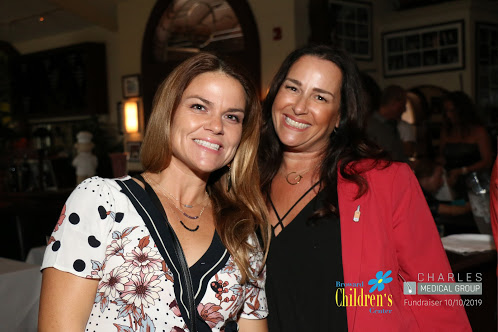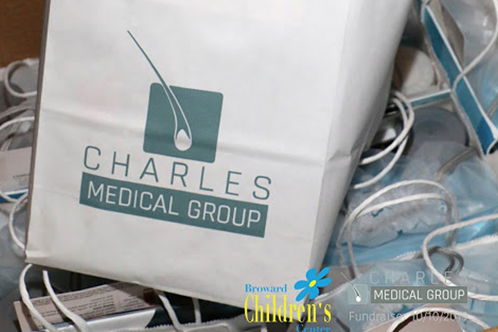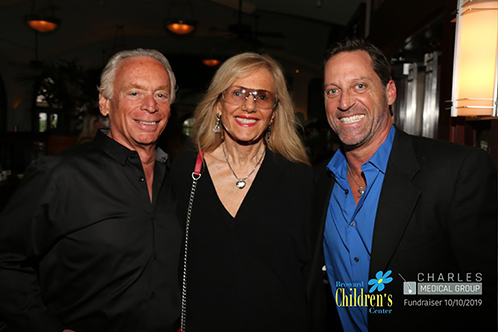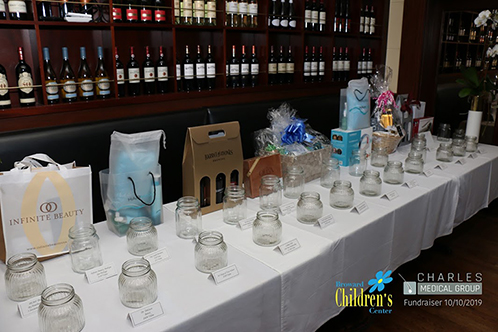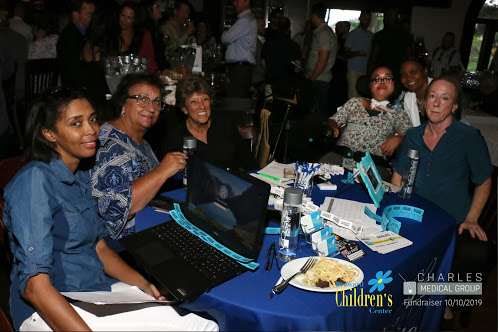Giving Back
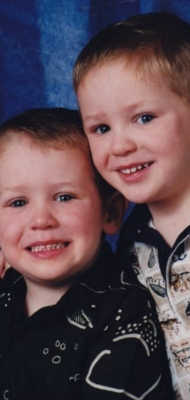 On Thursday June 14th 2012 Alex and Austin, identical twin brothers, underwent hair transplant surgery. Seven years ago in 2005, Alex was diagnosed with brain cancer and after months of treatment Alex had lost most of his hair and he has lived with this hair loss ever since. As such, the easy answer was to undergo a hair transplant procedure in order to re-grow his natural hair. In order for hair transplants to be successful the hair needs to be 100% genetically identical to the receiver, but unfortunately the cancer treatments had made it impossible for Alex to find a donor area on his head. This is where Austin comes in; because they are 100% genetically identical Austin was able to donate hairs from his head to be transplanted into his brother’s. With the help of Dr. Charles, the transplant was completed and over the next 6 to 12 months we will be awaiting the transformative results of this truly remarkable story.
On Thursday June 14th 2012 Alex and Austin, identical twin brothers, underwent hair transplant surgery. Seven years ago in 2005, Alex was diagnosed with brain cancer and after months of treatment Alex had lost most of his hair and he has lived with this hair loss ever since. As such, the easy answer was to undergo a hair transplant procedure in order to re-grow his natural hair. In order for hair transplants to be successful the hair needs to be 100% genetically identical to the receiver, but unfortunately the cancer treatments had made it impossible for Alex to find a donor area on his head. This is where Austin comes in; because they are 100% genetically identical Austin was able to donate hairs from his head to be transplanted into his brother’s. With the help of Dr. Charles, the transplant was completed and over the next 6 to 12 months we will be awaiting the transformative results of this truly remarkable story.
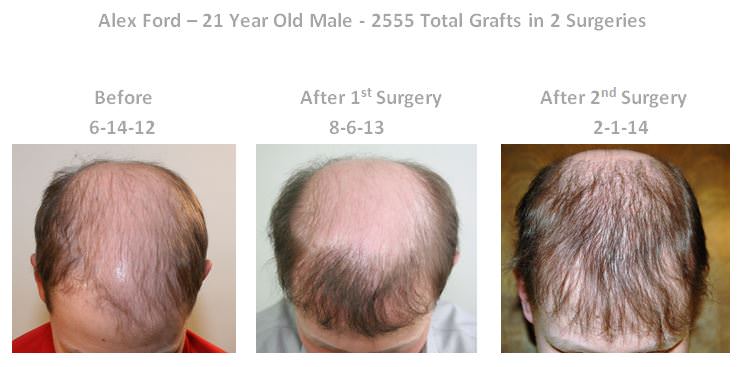
The Twins story on NBC
Alex
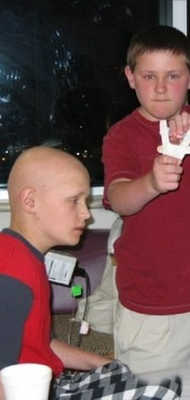 In 2005, I was diagnosed with a malignant brain cancer. After 9 months of rigorous treatment, which included the maximum amount of radiation allowed for medical treatment and six months of caustic chemotherapy treatments, I was completely cancer free, and have been since. While most chemotherapy patients will regrow their hair after treatment, mine grew back extremely thin all around and almost non-existent on the scalp.
In 2005, I was diagnosed with a malignant brain cancer. After 9 months of rigorous treatment, which included the maximum amount of radiation allowed for medical treatment and six months of caustic chemotherapy treatments, I was completely cancer free, and have been since. While most chemotherapy patients will regrow their hair after treatment, mine grew back extremely thin all around and almost non-existent on the scalp.
After seven years of waiting, I finally decided to seek treatment for my hair loss. This is where it gets interesting. Since I have no donor areas at all, Dr. Charles did something truly extraordinary. He used hair from my identical twin brother to frame the front of my scalp, to give the appearance of a full head of hair. We only did a small amount, 957 individual grafts, because this has never been done before. Most people have no problem because the hair removed is their own, and even though blood tests have proved that my brother and I are 100% genetically identical, we wanted to make sure it would work before we did anything more.
Another really cool part of the operation was that Dr. Charles used a revolutionary new machine, the ARTAS. It uses mathematical algorithms to count the individual hairs in a 25 sq cm grid, then uproots them, spacing them for maximum yield without removing enough to show and also with no scarring.
From the moment we first made contact with him, Dr. Charles has been nothing but extremely supportive and excited to do whatever possible to help restore a sense of normalcy to my life. I am absolutely sure that there is no one else like this man, and because of his obvious expertise and care for his patients, I would recommend him to anyone in need of anything from advice to hair restoration.
Austin
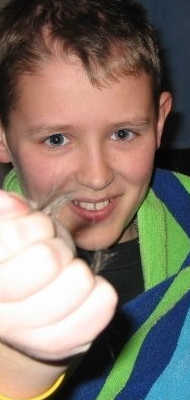 I have not lost any hair. I am a 19 year old college student who has almost no chance of having a receding hair line. My hair will always be nice and thick, but I’m not here for myself. I’m here for my brother, Alex, who is my genetically identical twin brother. Alex was diagnosed with stage four Medulablastoma when we were 12 years old. After the maximum radiation treatments allowed and several rounds of chemotherapy, Alex beat the disease a year and a half later. However, he was left with almost no hair on his head – what was left was thin and wispy, and his scalp is easily visible everywhere, including the shunt that serves as an overflow for his brain fluids. This shunt is the worst part of his baldness – it makes his head irregularly shaped and is the main target of stares by our peers. If it weren’t for the shunt, he’d go bald – but that’s not an option. So that is why I decided to donate my own hair to him.
I have not lost any hair. I am a 19 year old college student who has almost no chance of having a receding hair line. My hair will always be nice and thick, but I’m not here for myself. I’m here for my brother, Alex, who is my genetically identical twin brother. Alex was diagnosed with stage four Medulablastoma when we were 12 years old. After the maximum radiation treatments allowed and several rounds of chemotherapy, Alex beat the disease a year and a half later. However, he was left with almost no hair on his head – what was left was thin and wispy, and his scalp is easily visible everywhere, including the shunt that serves as an overflow for his brain fluids. This shunt is the worst part of his baldness – it makes his head irregularly shaped and is the main target of stares by our peers. If it weren’t for the shunt, he’d go bald – but that’s not an option. So that is why I decided to donate my own hair to him.
A few months ago, our dad contacted a hair restoration professional named Dr. Glenn Charles in Florida. He sent him an email detailing our situation, and asking what possible paths we could pursue. Within the hour, Dr. Charles called back, and said that he’d do whatever was necessary to help us out, given the fact that he has identical twin boys of his own. Dr. Charles contacted the International Society for Hair Restoration Surgery and requested financial aid to help us. A few short months later, we found ourselves en route for Fort Lauderdale. There, Dr. Charles and his staff, as well as certain hair restoration “celebrities,” took a very personal interest in our case, ensuring the absolute success of the procedure. We went with the Artas Follicular Unit Excision system, to minimize the impact on my own hair and ensure perfect grafts for him. Anesthetic aside, the procedure was painless, quick and efficient – surprisingly so. Even as they removed the follicles from my head, nurses began implanting them in Alex’s in the next room over. All in all, more than 950 follicles were transplanted. This is but one procedure of many; more of a test really, to ensure that the procedure will work. We’re sure of its success, though. Dr. Charles and his team and the Artas system’s efficiency are proof enough.
The Twins story on CBS Miami
Twin Donates Hair To Brother Who Beat Cancer For Radical Transplant Surgery
MIAMI (CBSMiami) – Battling cancer is tough enough. Now, imagine battling the disease as a teenager.
One survivor beat the odds, but the harsh treatments left him bald and a target for judgmental eyes.
That’s until a South Florida doctor gave Alex Ford a second chance at living out his dream.
Alex is an identical twin. He and his twin, Austin, were happy children. They were inseparable and shared everything. But, at the age of 11, Alex was diagnosed with brain stem tumor. With multiple lesions on his spine, he went through 30 rounds of radiation and daily chemotherapy for months. Austin never left his side.
Austin remembers the difficult times.
“As identical twins, we’re supposed to be same in everything,” he said. “But watching as his hair fell out, as I grew up and went through puberty, it was not easy as we diverged.”
It was a tough battle, but Alex beat cancer. The treatments, however, left him permanently bald and self-conscious. He was always wearing hats. As a freshman in college, the judgmental eyes of students were sometimes unbearable even for the tough cancer survivor.
“I would get dirty looks, but more inquisitive, more like the freak show from people. It irked me a little,” Alex said.
His parents went searching for a solution and found cosmetic surgeon Dr. Glenn Charles who was willing to help.
After exchanging phone calls with Alex’s dad, Dr. Charles remembers warning the Ford family.
“I told the father I’m not sure if we could do this. It’s not even about the money, I’ll do it for free,” Charles recalled.
Charles, who has twin boys of his own, was touched by Alex’s story and his will for life. He agreed to do a ground-breaking procedure – a hair transplant surgery that had never been done before.
He would have to transplant hair from a donor by taking hair from Alex’s identical brother Austin and implanting it on Alex’s head.
A group of doctors donated their time and expertise.
Charles used the latest technology in hair transplant surgery called ARTAS® Robotic Assisted FUE (Follicular Unit Excision). The ARTAS® procedure is a computer-assisted, image-guided and doctor-controlled robot for use with a FUE Hair Transplant. The ARTAS® System uses sophisticated imaging technology to map out the follicular units on a head. It then chooses the optimal grafts to extract with precision before quickly and carefully harvesting each individual follicular unit of one, two, three or even four hairs.
Charles said this type of transplant surgery can only be done from identical twin to another identical twin.
“You can physically take hair from someone and put it on someone else’s head, but it’s just not going to grow. The body is going to reject it because it’s going to be a foreign object,” he explained.
After two procedures, about a year apart, and four years later, the results are showing.
Alex showed off all the hair on top of his head that is actually from his brother. He is pleased that he did the surgery because now he has some hair when he takes photos and when he talks to people. He feels as though he has a more youthful look.
“It has improved my quality of life even if we weren’t able to do the whole scalp,” said Alex.
Austin is excited because the surgery has changed the way Alex feels.
“From the front it looks a lot better,” he said. “Had we not done the procedure, it would have been bald.”
Alex said this experience has been a reminder of what really matters. He said it’s not always about how things look on the outside, but more about how people make you feel in the inside.
“As twins, you are pretty much bonded for life,” Alex said. “It increased the love I have for him [Austin] even further just knowing he would be there for me.”
Charles is thrilled to have been a part of Alex’s journey.
“It’s touching. I don’t want to think too much about it because I’ll get all teared up. People do anything for their kids. If you can help them out, it’s a great thing. We’re doing what we do to make a living pay our bills, but something like that really has more value than anything,” he said.
Alex has been cancer free for 11 years. He is about to graduate college and is planning a career in biology.
If you would like to know more about Alex and Austin Ford or Dr. Charles, visit www.CharlesMedicalGroup.com.
See the full story on CBSMiami.com.
Second Annual Smokin’ Hair Happy Hour at the Broward Children’s Center
Dr. Charles along with generous sponsors and supporters raised close to $4000 for Broward Children’s Center at their Second Smokin’ Hair Happy Hour.
“Having been involved with BCC for three years now, we felt it time to host another event that would make a big impact for these kids and this fantastic facility,” said Dr. Charles. “What started as a fundraiser three years ago turned into monthly trips to visit the kids. Seeing firsthand the resilience of the children, the dedication of the staff and the work that goes on daily was our push to host our second event to raise funds for this excellent resource in our community.”
For over 40 years Broward Children’s Center has been a haven for infants, children and young adults with special needs and medically complex conditions between the ages of birth and 21 years. The nonprofit’s mission is to provide a continuum of care, including a medical, educational, therapeutic, and recreational care, to increase the quality of life to the BCC service population and their families.
